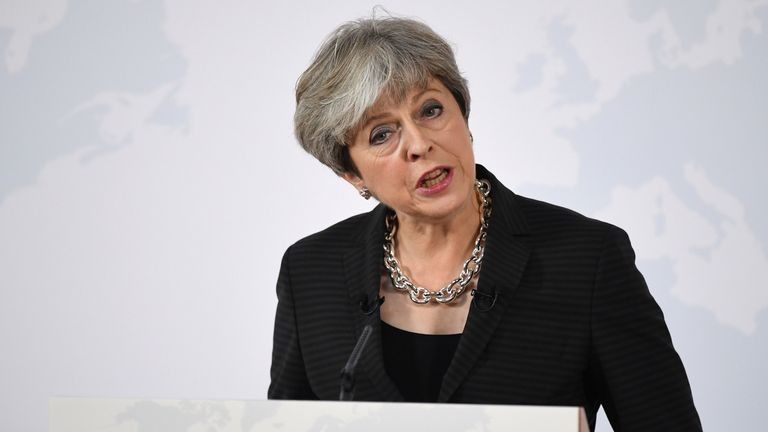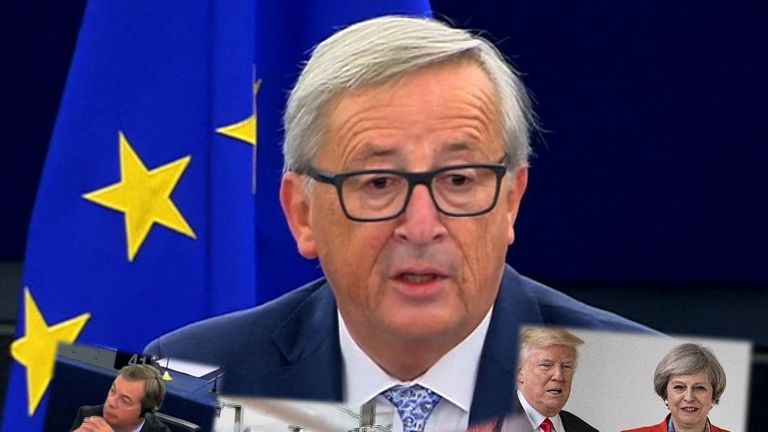Barnier: 'Not enough progress' for next phase of Brexit talks
The EU's Brexit negotiator's view is backed by a European Parliament vote, dealing a fresh blow to UK hopes of moving talks along.
Tuesday 3 October 2017 20:28, UK
The EU's chief Brexit negotiator has said not enough progress has been made in divorce talks to begin discussing a future trade deal.
The EU says that "sufficient progress" must be made on three key issues before the talks can move on to the next phase: EU citizens' rights, the Irish border and Britain's financial settlement, or "Brexit bill."
Britain is keen to move the talks on to trade, but Brussels has stood firm in its stance.
Speaking to the European Parliament in Strasbourg, Michel Barnier, the chief negotiator, said: "Today we have not yet achieved sufficient progress to begin in full confidence the second phase of negotiations."
Mr Barnier called for greater clarity from Britain on those key issues.
And on Tuesday the European Parliament overwhelmingly backed a motion saying Brexit talks had not made enough progress.
The vote - 557 votes to 92 - is not binding, but it deals a fresh blow to the UK's hopes of moving the talks along.
Mr Barnier's view was also underlined by European Commission President Jean-Claude Juncker, who said: "We first need to agree on the terms of the divorce and then we see if we can lovingly find each other."
The bill has emerged as a major obstacle in the negotiations.
While Theresa May's Florence speech promise that the was seen as "conciliatory", Mr Barnier said that her offer to fulfil Britain's EU budget commitments up to 2020 did not go far enough.
"We will never accept for the 27 to pay what was decided on by 28, it's as simple as that.
"The taxpayers of the 27 don't have to pay for the consequences of the decision that they didn't take", said Mr Barnier to rapturous applause.
Another major sticking point is the future role of the European Court of Justice (ECJ) for the UK post-Brexit.
Mr Barnier says the court should oversee EU citizens' rights in order to provide "a consistent interpretation of the agreement on both sides of the Channel".
Mrs May has previously said that after leaving the EU, the UK would no longer follow the jurisdiction of the ECJ.
However, in her Florence speech she conceded that ECJ law could be taken into account in the case of EU citizens living in the UK.
Mr Bernier also suggested that some in Britain have under-estimated the "very heavy human and social, legal, financial, technical and economic consequences of Brexit".
Guy Verhofstadt, the European Parliament's co-ordinator on Brexit, said divisions between senior British ministers were slowing down negotiations.
"There is a lack of clarity, there is even disunity. There are oppositions between (Philip) Hammond and (Liam) Fox. There are divisions between (Boris) Johnson and May," Mr Verhofstadt said.
The has been dominated by reports of infighting over the Government's Brexit strategy.
Former Ukip leader Nigel Farage, an MEP, accused the EU of holding Britain "hostage" by refusing to have an "intelligent conversation" about trade.
Referring to Mrs May's Florence speech as "pitiful" and the EU as a "bully", he said: "This charade cannot go on for year after year; after all we voted Brexit."
The fifth round of Brexit talks is due to start in Brussels on Monday.






